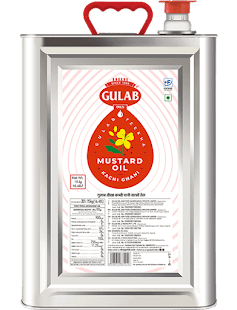Different historical fantasies are available about the determination of mustard oil however the mustard seeds are very well known to cure different ailments which are in presence before the birth of Christ, It’s about five centuries earlier than the Christian era. It is assumed that mustard seed had a presence in nations like China and Africa sometime before Jesus was born.
The Modern Period of Mustard Oil
In the year 1720, mustard seed is utilized for the first time in cooking, just as the idea that oil can be gotten from the seed came into region, however old Ayurveda has referenced about the use of this oil a long time ago. During the eighteenth-century mustard seed was expended at an enormous scale in America. It is likewise accepted that mustard was developed in the Indian known as Sarson Ka Tel subcontinent around 3000 B.C.E. Antiquated Romans used to blend this exceptional seed to wine for its sharp flavor and for medicinal treatments.
The Scientific Side
Among forty types of mustard plants, the most prevalent and broadly utilized seeds are Brassica Nigra, Brassica Hirta and Brassica juncea. Mustard cultivation should be done in the long stretch of March or April, during June the blooms can be seen lastly in the period of September the gathering is finished to extract Sarson Ka Tel from it. One significant thing to be recalled, that the seeds should be yield before complete developing as the developed seeds cause tearing and dropping without anyone else. Today, mustard is to a great extent developed in Canada, Montana and North area of Dakota.
The Process of Making Oil
Sarson Ka Tel is produced using two distinct strategies; right off the bat, greasy oil is inferred by squeezing the musta
rd seed and also fundamental oil is removed from crushing the seeds. Thereafter the two oils are refined and we get the customer benevolent one. The sharpness originates from an activator present in the oil called allyl isothiocyanate. Mustard oil contains 60% monounsaturated unsaturated fat, 21% polyunsaturated fats and about 12% soaked fats.
Sarson Ka Tel is a crucial piece of Ayurveda
Mustard oil is a crucial piece of Ayurveda; it was utilized for purifying, invigorating and reviving the body during the antiquated time, still, it is famously and widely utilized in India, Bangladesh and scarcely any other Western nations. There are debates in regards to the impacts of mustard oil (Sarson Ka Tel) to serve heart however it is demonstrated that rubbing with this oil improves weight and length of babies when contrasted with newborn children with no back rub. As indicated by the mustard oil producer in India, it is doable to counsel the specialist before picking the correct brand of mustard oil as per person's wellness prerequisite.
Ancient Origins:
The history of mustard oil dates back thousands of years and can be traced to ancient civilizations in different parts of the world. The use of mustard seeds for oil extraction and culinary purposes has been documented in ancient Indian, Egyptian, and Greek texts.
In India, mustard oil, known as "Sarson ka tel" in Hindi, has a rich culinary heritage and is deeply ingrained in the country's cuisine. It has been an integral part of Indian cooking for centuries and is used to add depth and flavor to various dishes. Mustard oil is particularly prominent in the cuisine of the northern and eastern regions of India, where it is used for pickling, sautéing, and deep-frying.
In ancient Egypt, mustard seeds were highly valued for their oil, and it was considered a luxury item. Egyptian pharaohs were known to use mustard oil for culinary purposes, as well as for cosmetics and skin care.
In the Mediterranean region, particularly in ancient Greece and Rome, mustard seeds were cultivated for both their culinary and medicinal properties. The oil extracted from mustard seeds was utilized in cooking, massage oils, and as a natural remedy for various ailments.
Spread and Popularity:
Over the centuries, mustard oil found its way to various parts of the world through trade and cultural exchanges. As explorers and traders traveled across continents, they carried mustard seeds and oil with them, introducing this flavorful oil to new cultures and culinary traditions.
In Southeast Asia, mustard oil gained popularity in countries like Bangladesh, Nepal, and Pakistan, where it became an essential ingredient in local dishes. It also found its way to China, where it is used in certain regional cuisines.
In parts of Africa, particularly in Ethiopia, mustard oil became an important cooking medium, and it continues to be used in traditional Ethiopian cuisine to this day.
Cultural Significance:
Beyond its culinary use, mustard oil holds cultural and religious significance in some societies. In parts of India and Nepal, mustard oil is used in religious ceremonies and festivals as an offering to deities. It is believed to have purifying properties and is used to anoint idols during religious rituals.
Conclusion:
The history of mustard oil is a journey through time, reflecting the cultural, culinary, and medicinal significance of this versatile oil. From ancient civilizations to modern-day kitchens, mustard oil continues to leave its mark on various culinary traditions and is cherished for its distinctive taste and numerous benefits.
For more information: https://www.gulaboils.com/
View Source :- https://gulaboils20.mystrikingly.com/blog/the-history-of-mustard-oil-also-known-as-sarson-ka-tel


Comments
Post a Comment